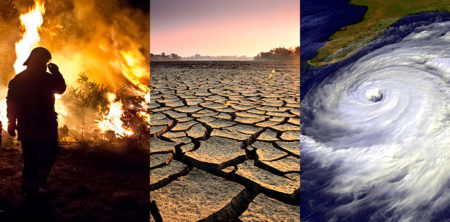15 January 2024
By Roger Kennedy
roger@TheCork.ie
Ocean acidification is being brought on by the atmosphere’s increasing carbon dioxide content. That is a process that poses a major threat to marine life and the entire oceanic ecosystem. Beyond that, it poses a significant danger to the health of our planet, Earth.
Understanding Ocean Acidification
As previously noted, ocean acidification is a natural phenomenon that results from CO2 absorption into the ocean. This happens when the CO2 combines with seawater. As a result, carbonic acid is produced. The pH of the ocean automatically decreases when carbonic acid levels rise. When the carbonic acid increases there is an automatic decline in the ocean’s pH level. What’s even more concerning is that since the rise of the Industrial Revolution, our oceans have absorbed roughly 30% of the CO2 released into the atmosphere. This absorbsion led to a profound shift, with the ocean’s acidity levels rising by a frightening 26%.
Impact on Marine Life
Many marine species are at danger of not surviving due to the severe effects of rising ocean acidity. Specifically those reliant on calcium carbonate to form their shells and skeletons. This encompasses corals, mollusks, and specific types of plankton. The highly acidic environment limits the availability of essential carbonate ions. Those are vital for these organisms to create and maintain their calcium carbonate structures. This could result in weakened shells, stunted growth, and even mortality.
Known as the “rainforests of the sea,” coral reefs are particularly vulnerable. They serve as homes and shelter for countless marine species. Their decline due to acidification, in addition to other stressors like warmer waters and pollution, could potentially have catastrophic consequences.
Disruption of the Food Web
The impacts of ocean acidification ripple up the food chain. The basis of the marine food chain is made up of plankton. Acidification affects plankton. This, in turn, affects the species that feed on them, like important fish species. This disrupts marine ecosystems. It also threatens the livelihoods of fishing-dependent communities. Most palpably, it affects the health of people who rely on seafood as a primary protein source.
Socioeconomic Implications
The repercussions of ocean acidification extend beyond environmental concerns. Economies that depend on marine resources, such as fisheries and tourism, are at risk. A decline in fish populations and the degradation of coral reefs can lead to reduced catches. It can also result in a decrease in tourism. This impacts both local and global economies.
Cultural and Social Implications
There are also important cultural and social ramifications. Deep cultural linkages exist between many indigenous and coastal cultures and the water and its inhabitants. Cultural customs and behaviours may be significantly impacted by the extinction of marine species and their habitats.
Novel approaches to addressing these issues are being investigated. Researchers and scientists are looking into ways to directly slow down acidification. By introducing buffering materials to specific regions of the water, they are doing this. Conservation activities are the subject of policy initiatives. They increase the resilience of marine ecosystems.
International cooperation is essential. Developing effective strategies to solve this global challenge requires international cooperation. Ocean acidification remedies can be funded and implemented in part by public-private partnerships.
Addressing the Challenge
The fight against ocean acidification needs to be multifaceted. The first step in lowering the rate of acidification is reducing CO2 emissions. Making the switch to renewable energy sources is part of this. It also entails implementing sustainable practices across a range of industries and enhancing energy efficiency.
Local and regional initiatives like reducing water pollution and managing fisheries responsibly can help lessen some of the consequences of acidification in addition to international efforts to cut emissions. Seagrass beds and mangroves are examples of marine ecosystems that can absorb CO2 and should be preserved and restored. This is also very important.
The Way Forward
Understanding the effects of ocean acidification depends heavily on research and observation. They are essential in addressing these effects as well. Researchers are looking at how various ecosystems and animals react to acidification. This aids in creating plans to lessen its impact.
Public awareness and education are important. More people understand the issue’s significance. Public support for policies and actions to reduce emissions is growing. Support for policies and actions to protect oceans is also growing.
All things considered, ocean acidification is a silent disaster that occurs in our oceans while we live. Its effects are extensive, impacting human societies, marine life, and world economies. Preserving the health and welfare of our planet is the reason for addressing this issue. It also has to do with protecting the health and welfare of next generations. Just as players strategize in a game of play online blackjack with live dealer for real money, we must address the challenge of ocean acidification strategically. We require local management, worldwide action, and ongoing monitoring and study. We bear responsibility for the condition of our seas and the life they sustain. Lets not take it for granted.

